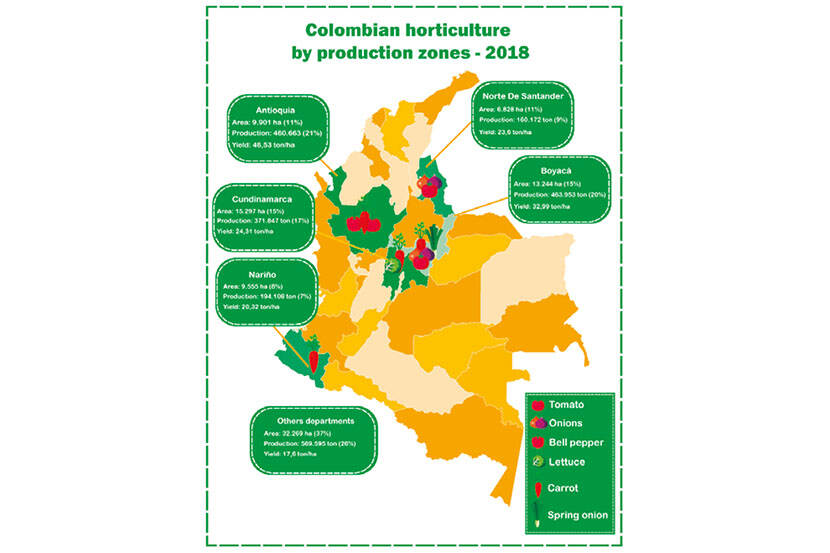Colombian horticultural sector and strategy for further positioning Dutch technology and know-how
Feeding the cities and sustainable development of the horticultural sector in Colombia is an important priority of the agricultural department (LAN Bogota) of the Dutch Embassy in Bogota. For that reason, LAN Bogota commissioned this study and strategy that provide insights into expected developments and challenges in the Colombian horticultural sector as well as input on how Dutch know-how and technology could contribute to address these challenges.
With more than 80% of its population already living in urban areas, Colombia needs to feed its ever growing cities. In Latin American megacities like Bogota there is increasing importance to access to food, as well as a demand in rise for higher quality, healthier, more sustainable and more diversified food. This is partly explained by the increasing purchase power of the middle class living in the Colombian cities translated into preferences for more sustainably produced food. Equally important is the inclusive growth of the often small producers in the rural areas around these megacities, who play a key role in local food supply. Furthermore, there is a need to improve productivity and quality, and in order to reduce the estimated 34% of food that is lost and/or wasted in Colombia (of which 62% are fruits and vegetables) there is a need for better connecting farmers with the market and introducing better postharvest technologies and agro-logistics.
Overcoming these challenges requires a change in the Colombian production system for horticulture food products with a different approach in the cropping systems. Particularly the segment of protected cultivation of “fruit” vegetables has potential, like tomatoes, bell peppers and cucumbers but also lettuce and herbs, currently produced mainly in open fields. Therefore, protected and more controlled cultivation – a field where the Netherlands has a solid track record - offers opportunities to improve sustainability, food safety and quality but also food security.
Acknowledged in the vision on circular agriculture of our Minister of Agriculture, Nature and Food Quality, Mrs. Carola Schouten, this is an area where the Netherlands, considering its knowledge, technology and innovations, could make an important contribution to a dynamic and at the same time more circular and inclusive growth and development of this sector in Colombia. A sector called to providing healthy and safe food to an increasing urban population, but at the same time facing ever increasing pressure from climate change, lack of employees and rising labour costs and pressure from the urban areas.
Nevertheless, information on the Colombian horticultural sector appeared diffuse and scarce. In order to have a better understanding of the present situation, expected developments and future challenges and opportunities of the protected cultivation of vegetables in Colombia, LAN Bogota in cooperation with the Netherlands Enterprise Agency (RVO) commissioned the study titled “Taste the Future: The potential of food horticulture in Colombia”. This study, conducted by N&S del Trópico S.A., presents the current situation of production and commercialisation of horticulture food products in Colombia and (mainly looking from a consumer perspective) of expected developments, challenges and (domestic and foreign) potential of the sector.

At the same time, along with the lessons learned from previous initiatives supported by the Dutch Embassy in Bogota, this study served as input to develop a strategy and action plan for LAN Bogota. This strategy, developed by RVO, includes a summary of the developments in this sector and recommended interventions on how to maximize the contribution of Dutch companies and knowledge centres to the sustainable and inclusive development of this sector in Colombia. In addition, the strategy provides insights into how the knowledge and technology base of the Colombian private sector could be strengthened with the Dutch technology and know-how by presenting relevant information on, for instance, areas of interest, key players, previous experiences and (RVO) facilities.
In the links below you can download the two documents. If you are interested in learning more on the developments of the horticultural sector in Colombia or want more information please send an email to BOG-LNV@minbuza.nl